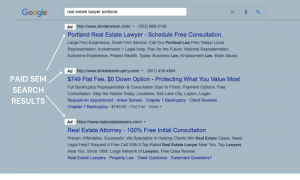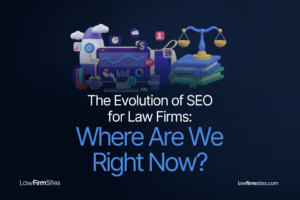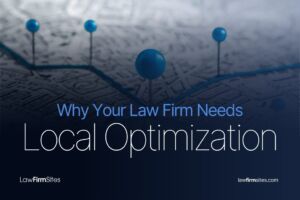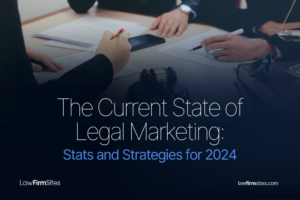SEO vs. SEM: What’s the difference between SEO and SEM for Lawyers?

SEO and SEM for attorneys are both great marketing strategies. They are similar in many ways – they both have the same goal of attracting potential customers.
In this blog, we will examine the similarities and differences between the two and how they can help you grow your law firm and make it profitable.
What is SEO?
Let’s start with a very basic overview of search engine optimization (SEO). SEO is the process of obtaining targeted traffic to a website from a search engine’s organic (naturally found) results.
These are the basic strategies for search engine optimization:
- On-page SEO (such as URLs, titles and meta descriptions, headers, etc.)
- Off-page SEO (such as link building, social media, etc.)
- Technical SEO (such as site maps, redirects, etc.)
We will dive further into each of these areas of attorney SEO marketing strategy later in the blog.
The goal of SEO is to improve a site’s rating in the organic search results. Search engine optimization for lawyers is a great way for law firm sites to be found without having to pay to get visitors to your website. These results will appear below the “ads” on a Google or other search engine search.

What is SEM?
Search engine marketing (SEM) is the practice of increasing search exposure via the use of sponsored and paid tactics.
The differences between SEO and SEM for law firms all just comes down to if you are paying to be seen on search engine results pages or not.
This can get confusing, especially when previously, the phrase “search engine marketing” was used to include both SEM and SEO, however, it currently almost exclusively relates to paid attorney SEO marketing.
Paid search advertisements may be seen on almost every page of search results. You’ve seen them before. These sponsored advertisements are usually seen at the top and bottom of the page, and they have an “Ad” label on them to indicate that it is a paid placement.

Choosing Between the SEO and SEM
If you’re having trouble deciding to go with law firm SEM or SEO, reach out to Law Firm Sites and we can help you decide what’s best for your business. Luckily, you don’t have to pick just one, as organic listings have no impact on paid advertisements.
We’ll go more in-depth on what really goes into SEO and SEM, as well as the pros and cons of each.
Overview of SEO
So, how do lawyers do SEO? Here’s a general overview.
What is On-Page SEO, and how does it work?
Search engines do not examine a website in the same manner that humans do. They can only read the page’s source code, which looks like this:

This will probably seem like a confusing mess if you are unfamiliar with HTML coding. Search engines, on the other hand, sift through this jumble searching for hints.
To comprehend on-page SEO, you must have a rudimentary understanding of HTML, the web’s fundamental code.
Tags may be found in a page’s source code. HTML code is contained within the > tag. Anything between two sets of tags may be placed on the page for someone to read. The content within the > instructs browsers and search engines on how to display the data in between tags.
In a nutshell, here’s everything that’s included in On-Page SEO
- Optimizing things on your website, like titles, content, internal links, and URLs with SEO keywords for lawyers
- Adding keywords to helpful content (including frequency and placement of said keywords)
- Outbound Linking
- Internal Linking
What is Off-Page SEO, and how does it work?
Simply put, off-page SEO refers to any SEO strategies that occur outside of your website, such as external link building.
Although link building is often considered to be the most important off-page SEO strategy, there are many more off-page SEO strategies to use if you want to acquire a competitive edge, such as
- Social Media
- Reviews and Awards
- Building up your credibility online
These signals are utilized as important trust and relevancy criteria by both search engines and people to determine the authority of your site.
What is Technical SEO, and how does it work?
Technical SEO is mainly the things that run behind the scenes on your website–the things users can’t see. If your technical SEO isn’t up to par, you’ll likely see your rankings suffer.
For example, how your site is structured falls under SEO. How are your pages linked to each other? What’s the hierarchy?
There are many checks and steps you should take to make sure your site is structured and being indexed correctly, and there are multiple tools you can use to check for any errors (we like to use Raventools).
Another technical SEO strategy that’s becoming increasingly more important is page speed.
People dislike having to wait for web pages to load. Even if your site is better than your competitor’s, you will be ranked lower than a site with quicker pages if your site takes too long to load.
This may be addressed by using a CDN to cache your website or reducing the file size of your pictures.
For your website, a competent SEO for attorneys firm will handle all three of these areas. This is the best method to see the biggest changes in your rankings.
However, there are certain SEO indications that are beyond a company’s control. Many search engines, for example, utilize the age of a page or a website as a ranking criterion.
Furthermore, it may take months for a search engine to re-rank your website following a modification, so don’t be discouraged if you don’t see your law firm search engine results immediately.
Overview of SEM
PPC
Pay-per-click, or PPC, is a very popular tool for legal firm SEM (those search results with “ad” we mentioned before).
These pages are ranked according to how much the sponsors are prepared to pay for a single visitor from a specific set of search results. Each time a user clicks on an ad result, a fee is charged to the company.
Thus, the term “Pay-Per-Click.”
PPC advertising solutions provide a lot of targeting versatility, allowing you to show advertisements just to those who fit the target demographic. This is a strategy if you want quick results.
People use search engines to find providers of both products and services, and whenever there’s an active audience seeking what your law firm has to offer, there is a good chance you will get new clients.
PPC can let you reach out to these individuals with a degree of precision that traditional advertising can’t match.
Ad Networks
Other ad networks to consider for generating growth include using PPC on platforms such as LinkedIn Ads, Amazon Ads, Facebook Ads, Twitter Ads, Bidvertiser, AdBlade, and several more. If you have questions about these networks, send us a chat!
Pros & Cons of SEO and SEM
What results will you get from each of these marketing strategies? Here are some final things to consider
SEO Pros
- SEO is less expensive than SEM
- Reaches more people
- More traffic sharing than SEM
- Better tracking ability
SEO Cons
- Requires several skill sets
- Need to stay up to date with algorithm changes
- Slower to attract customers than SEM
SEM Pros
- Exact target audience
- Ample results
- Good tracking
SEM Cons
- Expensive
- Results will falter quickly after the campaign ends
Do Law Firms Need SEO and SEM?
While SEO and SEM have advantages and disadvantages, both will work for your needs. You may want to consider using a mix of both for your law firm.
If you have any questions regarding web design and SEO for law firms, don’t hesitate to contact the lawyer marketing services team here at Law Firm Sites.
Did you like this post? Here are some others you might enjoy:

Search Engine Optimization (SEO) has become a critical tool for law firms to stand out. It drives more visitors to…

It’s easy to forget that every business is a ‘local’ business to someone. This is especially true for legal firms and attorneys who often…

The legal industry is constantly evolving, and law firms need to stay up to date with the latest digital marketing…

